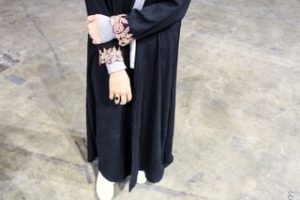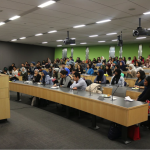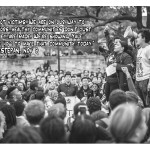
Typically, when men stare at her, she begins to worry.
At five foot two and 120 pounds, she recognizes how often her body is read as a threat — notably brown skin, almond-colored eyes framed with thick lashes, and a black hijab carefully draped in place. By looking at her, most people can predict that she is some type of Arab (pronounced A-Rab by people in her hometown, as if a rapper’s name) and definitely Muslim (pronounced mozlam).
Unable to place her, people would often ask, “Where are you from?”
“Chicago,” she’d respond, knowing this wasn’t the answer they were seeking.
“No, no. Where are you originally from?” They’d reply, exasperated now.
“I was born and raised in Chicago,” she’d repeat.
The back and forth would continue, them getting more irritated and insistent as she continued to tell a truth that was somehow unsatisfactory. Eventually, she’d reveal what they wanted to hear: that she is Egyptian. Though this is only true insofar as that is where her parents are from, it seemed to serve as an antidote to the chronic doubt that she could really have been born and raised in a suburb of Chicago.
It was in this suburb that she learned that being native-born does little to obscure foreignness. Despite her attempts at mimicking the enunciation of her white friends: a nasally “A” and a habit of drawing out her words to last many syllables longer than necessary, her bushy hair, thick eyebrows and hint of a mustache were all anyone had to see to distinguish her from her fair-haired friends. While these friends spent middle school worried about shaving the transparent hairs on their legs, she wondered how she could nab her father’s razor to shave her own legs, as well as her entire face clean.
In high school, she was introduced to threading and quickly went to work slimming her eyebrows and freeing her upper lip from peach fuzz. The elation of this transformation was quickly dampened by the fact that her bushy hair, previously unmanageable but free, was now sealed away behind a hijab. In the span of a year, she had gone from having too much hair visible to none at all, and what once seemed like a solution to her Otherness became a catalyst for it.
The only hijabi in her school, questions of “What are you?” became “Why are you wearing that?” and “Isn’t it hot under there?” When boys stared at her, she knew that their stares were different than when they were staring at her white friends — and she only really had white friends in her predominantly white school in a predominantly white suburb. Their stares were always perplexed and at times mocking, trying to make sense of a teenage girl that talked like them and walked like them, but wore jeans and long sleeves even when the weather was blistering. Looks of longing did not apply to her, and it made her feel guilty that she should want them to in the first place.
As she grew older, the stares of white teenagers turned into the stares of white men. These stares, having lost some of their boyhood innocence, ranged from hostile to objectifying, though at times she couldn’t tell the difference between the two. Raised by conservative parents, she’d been taught that her body was her responsibility to obscure and that any non-consensual gaze or touch was the direct result of her failure to do so. The perfect player, she excelled at the game of making what she understood as femininity disappear — wearing shirts that were too big, too long, and too stifling in an attempt to hide an anatomy that developed too early and too pronouncedly. She took all glances at her body as marks of personal failure; for all the ways that she’d learned to judge herself, desirability was not one of them.
***
She discovered in college that she was pretty, a surprising sort of revelation that kept her staring in the mirror longer than usual, trying to identify what others saw that she didn’t. Her hijab, still black though admittedly better-styled, framed the same face she remembered always having. She didn’t feel pretty, although she tended to always think of prettiness in the negative. Certainly, it’s an emotion made out of lack, feeling the most extreme in moments of un-prettiness and moments of self-consciousness. Perhaps, she thought, it was the absence of these feelings that marks what it means to feel pretty.
Indeed, she spent much of her first year in college learning to navigate absence of all kinds. In the absence of her watchful parents, religion suddenly became her own responsibility, and it didn’t take her long to begin dodging the school’s Muslim Student Association. In the absence of her white suburb, she discovered diversity of peers, reveling at how so many different people could be in the same place. Most of all, she relished in the absence of stares, feeling utterly protected inside the liberal bubble that seemed to encompass her school. And at the end of the school year, in the absence of any desire to return home, she signed up to study abroad and soon found herself on a flight to Rabat, Morocco.
There, for the first time, her days were filled with women who looked like her: women wearing hijabs of all colors, styles, and fabrics darting through the streets, wandering through the supermarkets, teaching in the schools. In Morocco, it felt as though being Muslim wasn’t the exception. She craved the anonymity of being just one of the many brown-skinned, hair-covered girls that filled the city.
She quickly learned, though, that the term “Muslim” is a descriptor as arbitrary as calling someone “tall” or “blonde.” The stares of Moroccan men — many of whom were Muslim men — were aggressive. A normalized culture of catcalling and street harassment made the difference between a hijabi and non-hijabi all but disappear. It seemed that nearly all women were subject to the unwanted attention of men who spent their days smoking lazily in front of cafes. Chairs were turned to face the sidewalks and seating arrangements rearranged to get a better view of the street. The eyes of taxi drivers could be seen in the mirror appraising women as they sat in the back seat. Cars would slow and windows would lower for men to call out, offering women rides and a promise of marriage in the same breath.
Five times a day, the harassment of these men would be interrupted as the call to prayer wafted through the city. They would stub out their cigarettes and park their cars, heading into the nearest mosque to pray for forgiveness or permission to act on their lust—she was never sure which. The streets would settle and the crowds would thin. For a moment, the entire city could breathe freely as the smog of smoke and smut lifted. But as the speakers announcing the azan fizzled to silence, the miming of piousness would end and the men with their leery eyes would return to their spots, undeterred.
Her Arabic school’s garden became her sanctuary — its tall walls and gated front shutting away the unwanted attention for a few hours each day. The students, mostly foreign and English speaking, spent their time huddled under a large tent, gossiping and laughing as they drank black mint tea and took a break from their classes. After school ended, it was rare for anyone to leave right away, opting instead to do homework together in the cafeteria or read under the sun. It wasn’t until late in the day, when their host families would be expecting them home for dinner, that they would pack up and steel themselves for the chaos of hailing a cab in the busy street.
She spent two months in Morocco and as her Arabic grew stronger so did her disappointment in the Arab men that she encountered. Her entire life she’d wondered why it was that Muslim women had to be veiled, when Muslim men seemed to have no rules of modesty.
“Men must lower their gaze,” her mother would tell her time and time again. “They mustn’t look at women, and women mustn’t attract the gaze of men.”
She remembered these words as she boarded her flight back to the States, and scoffed as she thought of the men who harassed, stalked, and stared at her despite her hijab and loose dress.
Women don’t attract the gaze of men, she thought to herself as she took her seat. Men attack women with their gaze.
***
“I’m going to give you some advice as if I were speaking to my own daughter,” her uncle said, staring at her intently from across the table.
Her eyes darted away from his. The familiarity of his words and the term “uncle” felt too sudden. She’d after all only met the man 24 hours earlier and had only that morning realized he was nearly fluent in English. She was once again abroad for the summer, this time in Egypt, meeting family she only knew through Facebook and visiting the places of her mother’s childhood.
That morning, she’d been pulled from bed suddenly and told to get dressed as her aunt and stranger-uncle were coming to get her for breakfast. Breakfast, it turned out, was a large latte and shisha. She now sat clutching the green hookah pipe in her lap, somewhat bewildered at how she’d ended up there.
Her uncle, still staring at her, seemed to be waiting for a response and so she nodded, taking a deep drag from the pipe.
“Don’t love,” he said earnestly, leaning forward.
She let out a cloud of smoke, hoping the white vapor obscured the flash of surprise on her face.
“Don’t love,” he repeated. “You’ll only be disappointed.”
She opened her mouth to speak, but he continued hurriedly before she had the chance.
“You must find and marry a man that you don’t love. A man that you have no expectations of. If you have expectations, you’ll only be let down. If you don’t, you can only be surprised.”
This time, she didn’t try to speak, instead taking another drag of her pipe as she thought of all the men who’d disappointed her. Her uncle continued, the words falling off his tongue, each faster than the last.
“If you have to choose, choose the man who loves you more than you love him. Over time, you’ll learn to love him too. But, I’m telling you now, try not to love for as long as you can. Muslim men just want any Muslim women. Wait for the one who wants just one woman, and wait until you are sure that that woman is you.
Having finished, he sat back and took a drag of his own pipe, looking away from her for the first time. Her aunt, focused on her phone through that point, peaked at her face quickly, as if gauging her reaction. She kept her expression neutral, nodding once and then nodding once more as his words sunk in.
She thought of her mother, married at nineteen to a man ten years her elder, never able to attend college and stalled of her ambitions.
Don’t love.
She thought of her other aunt whose husband married another woman behind her back, claiming that in Islam it is permissible to have two wives but never answering how it could be morally okay to tell neither of them about the other.
Don’t love.
She thought of her own experiences with men. Of being followed and stalked in foreign streets and stared at in local cafes. Of nights spent waiting for her phone screen to light up with messages that wouldn’t come, and days wondering what she’d done wrong and why he suddenly wouldn’t text back. Of moments spent arguing with her father as he demanded she attend community college, insisting it wasn’t proper for a girl to live alone in a dorm.
Don’t love.
Men had given her a lot of unsolicited advice in her life, but this particular piece, she thought, seemed easy enough to follow.
-Noora Reffat ’19


